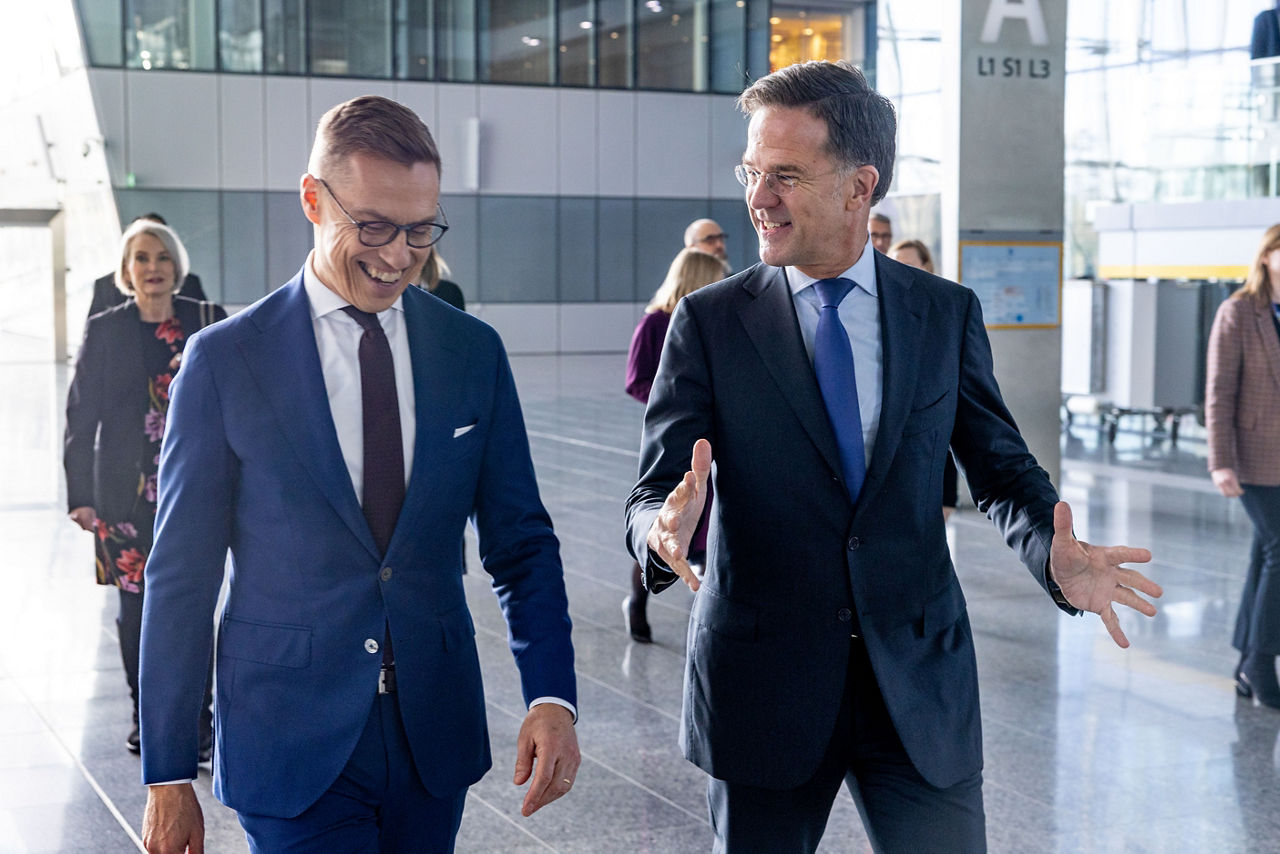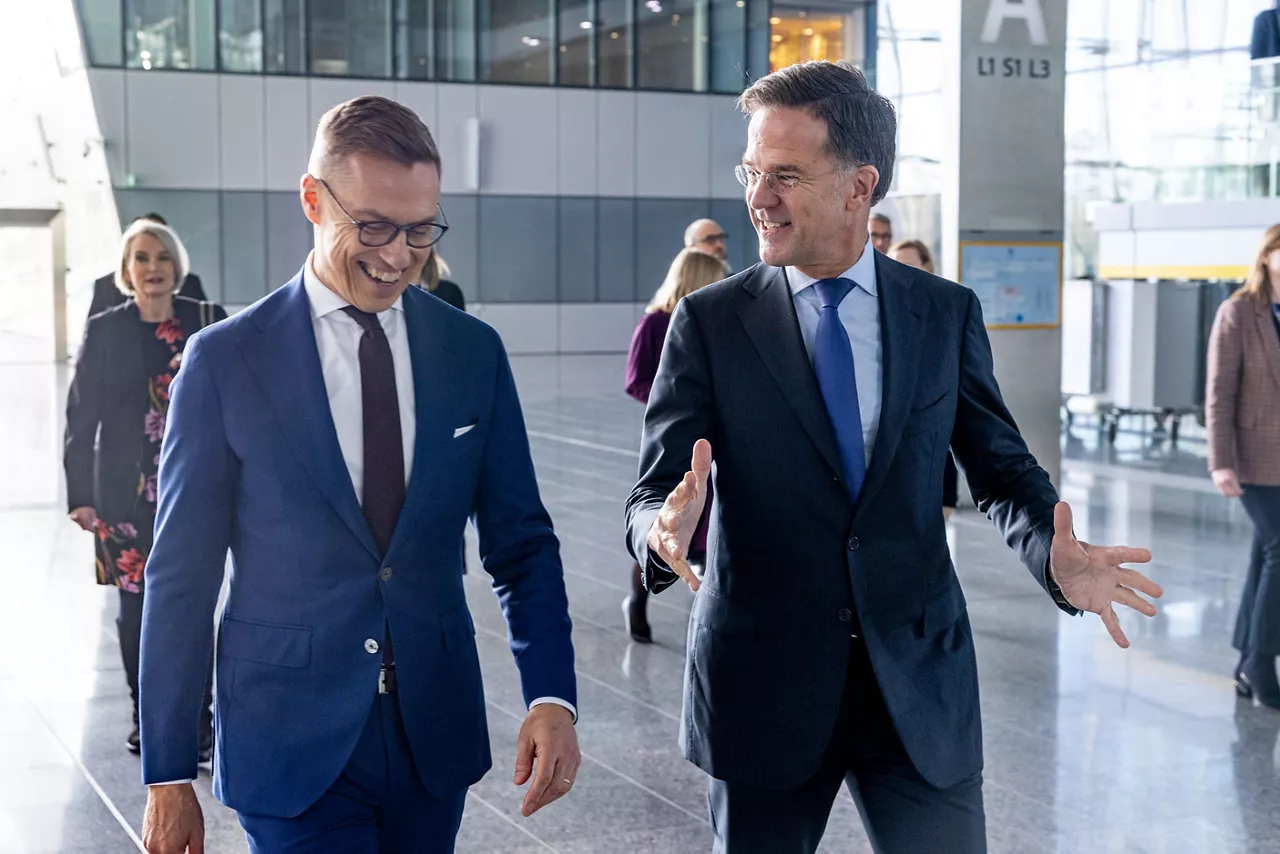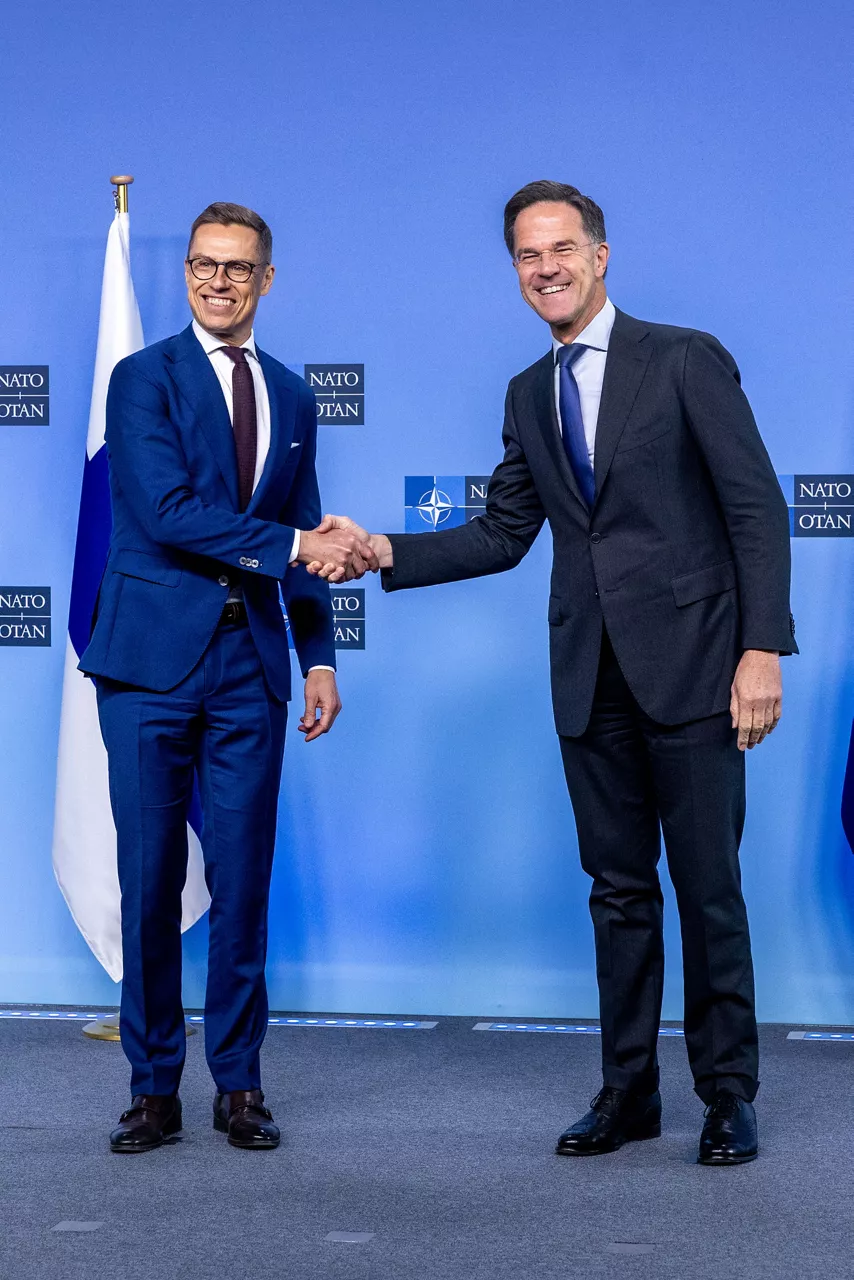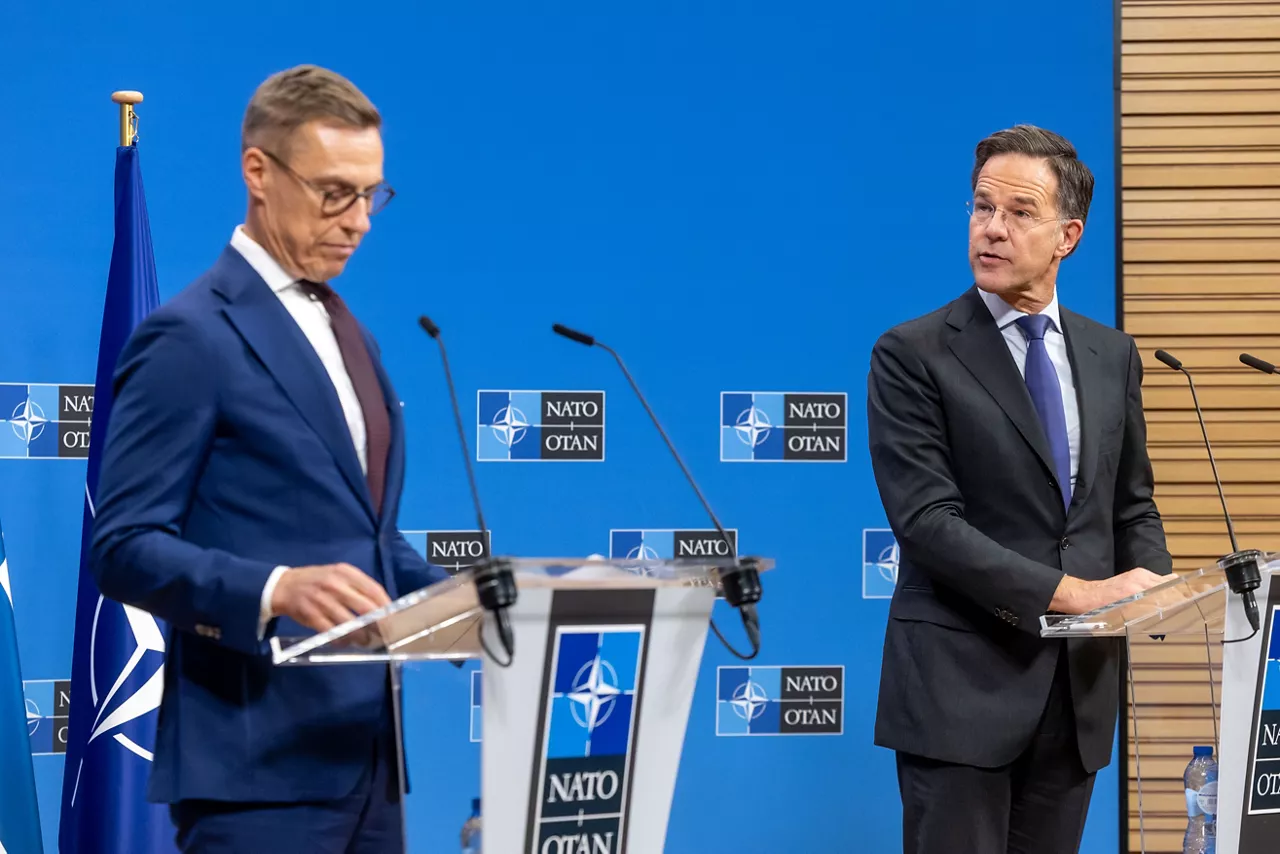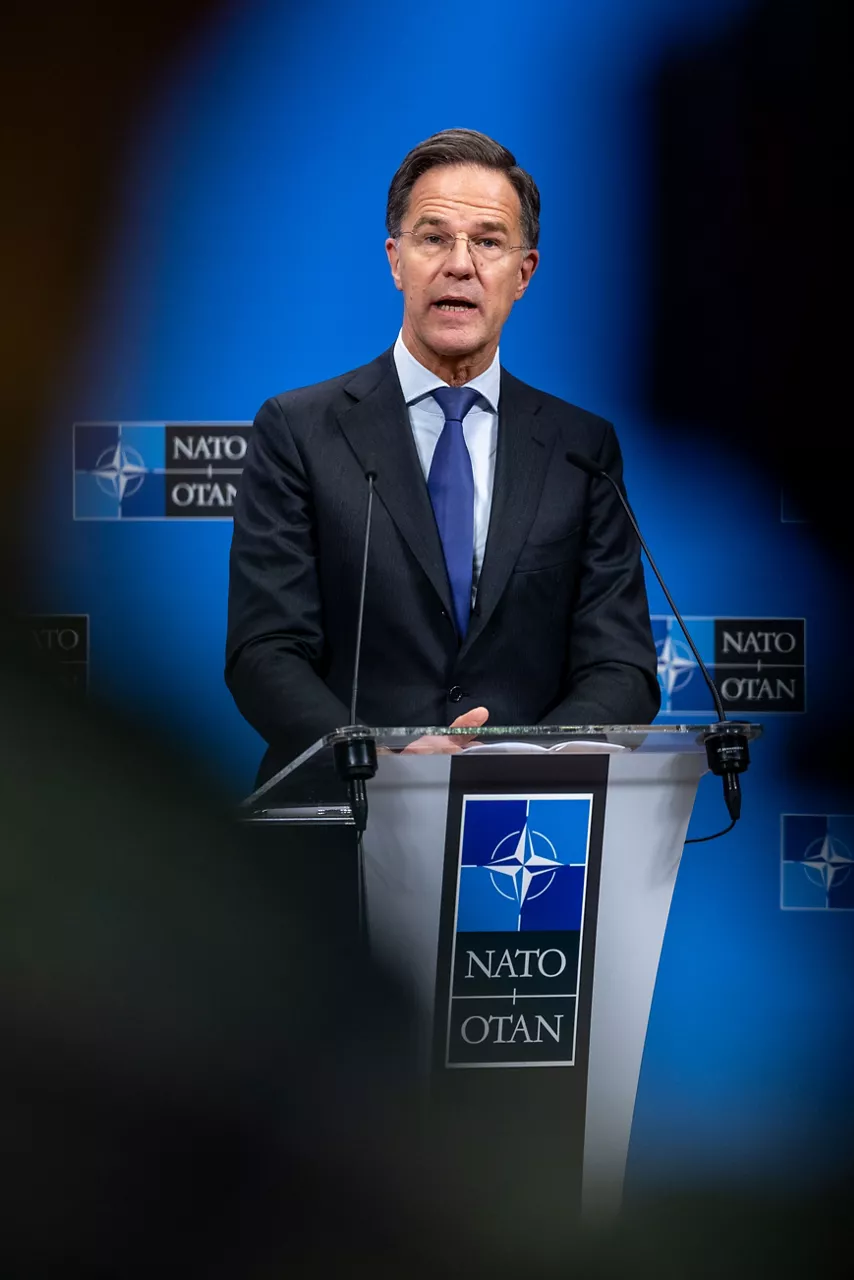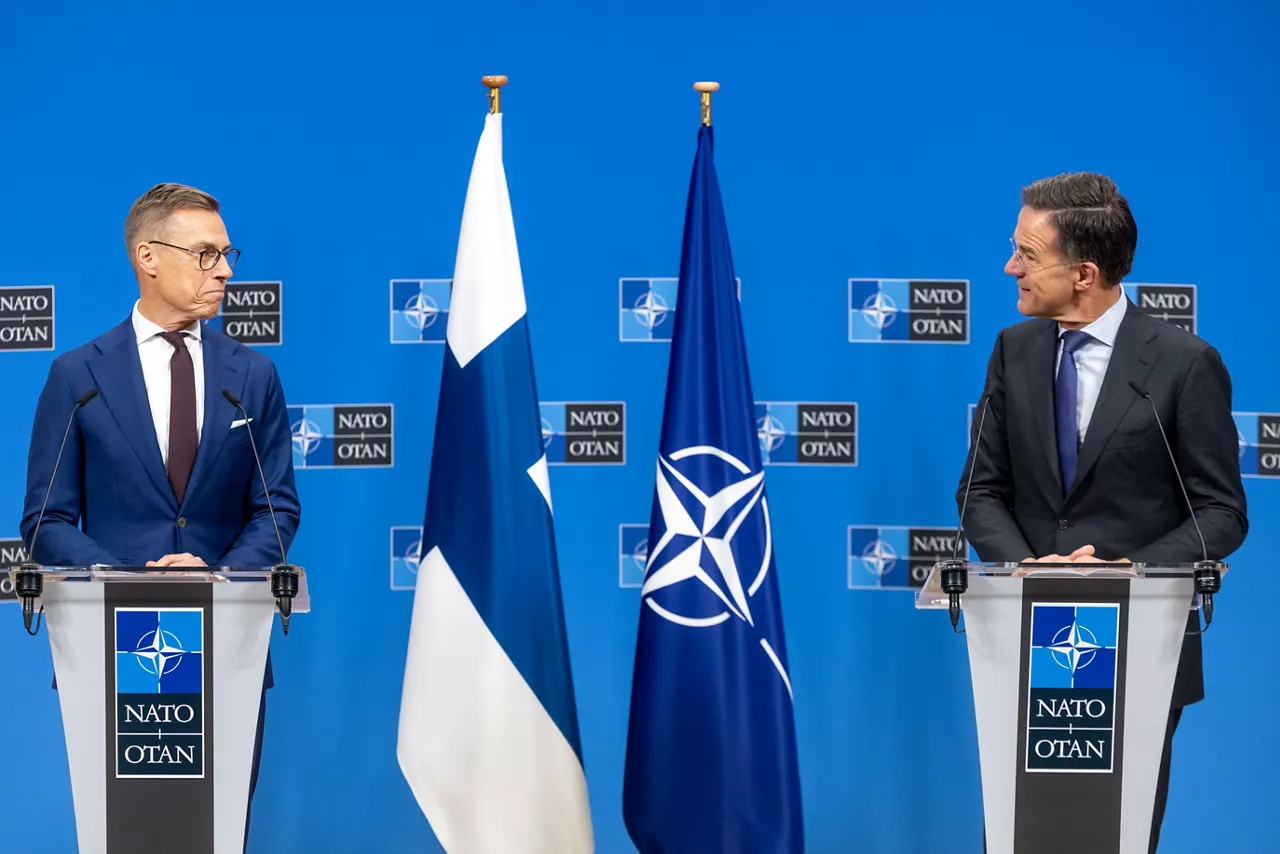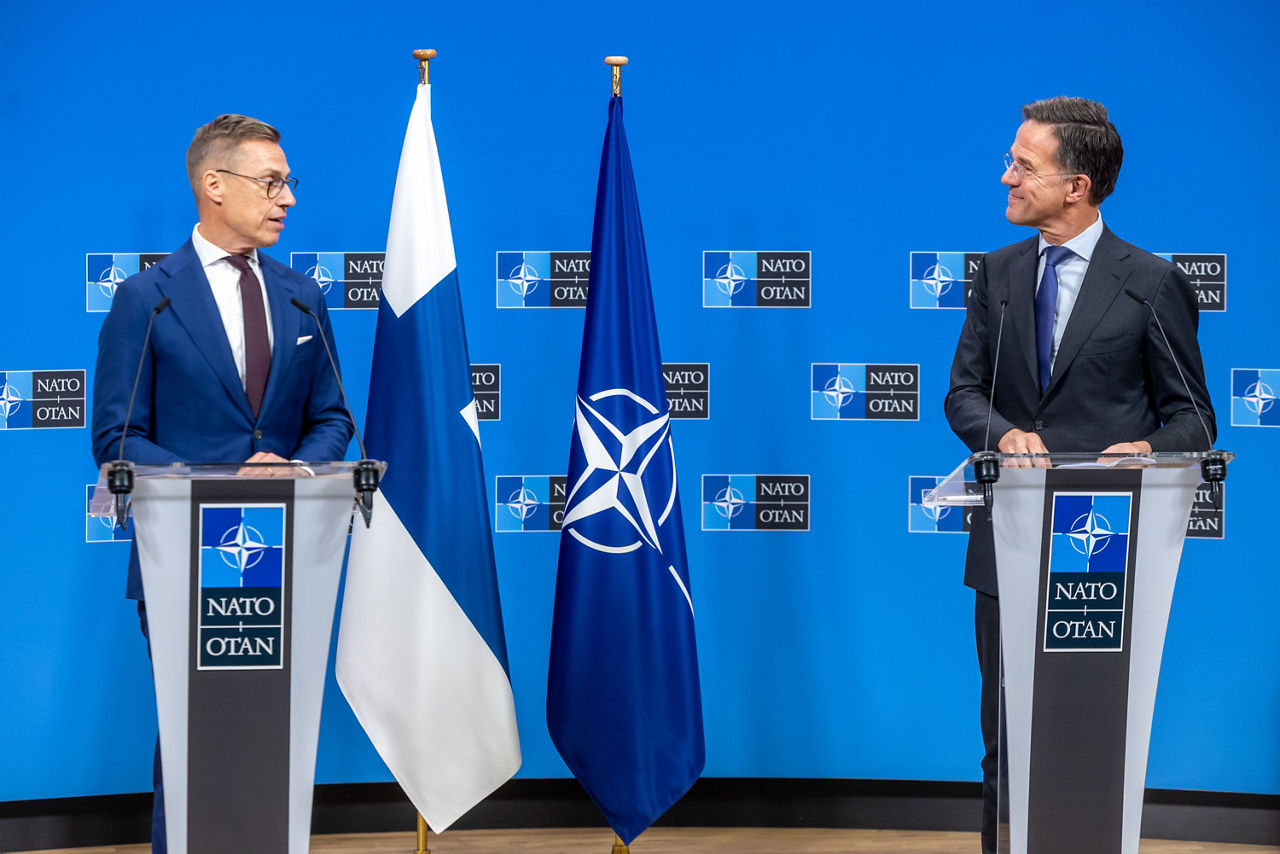Download NATO’s broadcast-quality video content free of charge

Log in
NATO MULTIMEDIA ACCOUNT
Access NATO’s broadcast-quality video content free of charge

Check your inbox and enter verification code
You have successfully created your account
From now on you can download videos from our website
Subscribe to our newsletter
If you would also like to subscribe to the newsletter and receive our latest updates, click on the button below.
Enter the email address you registered with and we will send you a code to reset your password.
Didn't receive a code? Send new Code
The password must be at least 12 characters long, no spaces, include upper/lowercase letters, numbers and symbols.
Your password has been updated
Click the button to return to the page you were on and log in with your new password.
President Stubb, dear Alex,
Welcome back to NATO Headquarters. You were the first Allied leader to visit after I took office last year and it’s always great to see you.
Finland is a valued Ally. Your membership strengthens NATO’s deterrence and defence. And Finland can count on your NATO Allies to stand beside you.
Finland has always recognised the importance of security, and you know what it takes to deliver it. You spent over 2.4% of GDP on defence last year, and will spend over 2.7% this year.
And together with Sweden, you are establishing a new NATO Forward Land Force in Finland that will further reinforce NATO’s posture.
And of course, I welcome the new Multi-Corps Land Component Command in Mikkeli, which will plan, prepare and run the activities of NATO land forces in Northern Europe.
Finland contributes to Air Policing – over Iceland this February and Romania last year. And most recently you deployed a counter-drone detachment in support of Denmark.
You also contribute to Baltic Sentry – which we launched in January in Helsinki to address threats to our critical undersea infrastructure. This effort has been remarkably effective, and it is a valuable complement to the work that Finland and other Allies around the Baltic undertake in their national capacities.
Finnish expertise in the High North is crucial. Last week, the Deputy Secretary General joined the first Arctic Space Forum in Helsinki, to advance work on space-based capabilities and strengthen deterrence, resilience and situational awareness in the Arctic.
Russia continues to wage a war of aggression against Ukraine.
Ukraine continues to defend itself with courage.
Allied support – Finland’s support – is making a difference.
Since the start of Russia’s full-scale invasion, you have provided roughly 3.8 billion Euros in support, including more than 2.8 billion in military aid: artillery, armoured vehicles, air defence and ammunition.
This year, you launched a three-year programme to supply Ukraine with materiel from Finland’s defence industry. Along with Baltic and other Nordic Allies, you helped start a new initiative to train and equip a Ukrainian brigade.
And you recently committed 100 million Euros to the Prioritised Ukraine Requirements List, PURL, enabling the delivery of urgently needed military equipment from the United States to Ukraine.
Economic pressure also matters. The latest European sanctions, along with US and UK measures against Russia’s largest oil companies, will further constrain the Kremlin’s war machine.
Deterrence and defence are the bedrock of our security.
Together, we are demonstrating readiness and resolve. We are making sure that more capabilities are available, whenever and wherever needed – on land, at sea and in the air. And we are working with industry to secure the technology, systems and ammunition required to defend every inch of Allied territory.
Our priorities are clear: to deliver on Allied defence spending; to boost defence industrial capacity; and to maintain our unwavering support to Ukraine.
So Alex, thank you for your friendship, your leadership and for Finland’s steadfast commitment to our common security. The floor is yours.
NATO Spokesperson Allison Hart
All right, we'll start with some questions, the second row here, Ilta Sanomat.
Hilda Hallikainen, Ilta Sanomat
Thank you. First, Mr. Secretary General, an explosion of some kind destroyed a railway track on Poland on Sunday. According to Poland, it was an act of sabotage. What is known about this? And was it sabotage? And secondly, our President, you said in the spring that we should mentally prepare for the fact that relations with Russia will be opened at some point, when could this become relevant? And has Russia given anything else regarding this?
NATO Secretary General Mark Rutte
On your first question, let me say that, of course we are in close contact with the Polish authorities, NATO and Poland intensely in contact on this. And of course, we now have to await the outcome of the investigation.
President of Finland Alexander Stubb
On your questions on when to open the contacts, I think in diplomacy, timing is always of essence. Right now, the time is to increase the pressure on Russia, both militarily and financially. Usually, I'm a realistic optimist, but to be quite honest, I don't see an end to this conflict this year. The earliest we can get into, to the negotiating table, would be sometime in February, March, but that is for President Zelenskyy to decide. As far as contacts from European leaders is concerned, there should be no solo acts. That is exactly what Russia is trying to do. So, if one European leader were to be in contact with his or her Russian counterpart, it would have to be closely coordinated.
NATO Spokesperson Allison Hart
Okay, we'll go to the second row, Reuters.
Lili Bayer, Reuters
Thank you so much. Lili Bayer from Reuters, I have a question for each of you. Secretary General, over the past weeks, we've seen quite a few drone incidents in Belgium, over airports, over sensitive installations. Is NATO providing any support to Belgium with these drone incidents? And what is your latest assessment in terms of attribution and risk of these particular incidents? And then, Mr. President, this morning, the Commission, President Ursula von der Leyen sent a letter to leaders, along with an options paper on financing Ukraine for the next two years. What is your message on these options, in particular what is your message to the Belgian authorities, since you're here in Brussels today, thank you.
NATO Secretary General Mark Rutte
On your first question, I was in contact with the Belgian Defence Minister, and I know that many Allies have provided support to Belgium. Very concrete support. So, there's typically a role of NATO to be in close contact with our Allies to make sure that whatever help is needed will come to the country. And I have no news about attribution.
President of Finland Alexander Stubb
When it comes to funding Ukraine, it seems rather clear that there are three options. The first one is that EU member states, or NATO member states for that matter, pay directly, either by taking more loans or using current reserves. The second option is the mutualisation of debt on a European level, as was done with Next Generation Europe and with SAFE. And the third option, of course, is the use of the immobilised assets. I will discuss these matters today with Belgium's Prime Minister. I think a lot of European leaders have understood the concerns that Belgium has in this situation, both political and legal. And I hope that when leaders start moving towards the European Council of December, that solutions will be found, because it is of utmost importance that we continue to fund Ukraine in its fight for its existence and survival.
NATO Spokesperson Allison Hart
Okay, coming to the third row, the woman in the beige jacket.
Kreeta Karvala, Kauppalehti
Kreeta Karvala, Kauppalehti Finland. What is the most important military action Finland should take when the United States reduces its presence in Europe? And this question is for both of you.
President of Finland Alexander Stubb
Well, I think we will see a reassessment of the US troop posture in Europe. At this stage, I'm not excessively concerned. We'll have to wait for both the National Security Strategy of the US and their National Defence Strategy. I think it's in the interest of all of us that the United States retains a foothold in Europe, and I don't see any signs of radical changes on that front, but perhaps the Secretary General of NATO knows better.
NATO Secretary General Mark Rutte
No, no, I completely agree with that reaction. What we also see is Europe stepping up. At the NATO Summit, where European and Canadian NATO Allies committed to the 5% defence spending, including 3.5 on core defence, which equalises defence spending now all over NATO with what the US is spending. We see the Europeans and Canada stepping up when it comes to military aid to Ukraine, and we have seen Canada and European Allies stepping up when it comes to the security guarantees in case a cease fire / a peace deal would be done on Ukraine. So, in all these issues and all these subjects, you see that basically Allies are stepping up. At the same time, we have a strong US military presence in Europe and on that, I completely agree with the reaction of the President.
NATO Spokesperson Allison Hart
Okay, time for just a couple more questions. Let's see, in the center here, second row.
Rikhard Husu, Yle
Thank you. Rikhard Husu, Finnish Broadcasting Company. Just a follow up maybe on the frozen assets, and maybe also to the Secretary General and to the President as well. How confident are you that there could be a decision ahead of December, in the upcoming few weeks, and how important would such a decision be as a signal for Ukraine ahead of a difficult winter? Thank you.
NATO Secretary General Mark Rutte
I mean, on the mobilized assets, obviously, that's something for European Allies, particularly those now part of European Council, to discuss. I should not comment too much on that. For me, the absolute priority is to make sure that Ukraine has what it needs to stay in the fight and to be prepared as strong as possible whenever any peace talks will start on a ceasefire long term, or a full peace deal. And for that, Ukraine needs financial support. For that Ukraine needs, of course, military support. It's crucial that what America is providing, paid for by Allies, will flow into Ukraine as it is currently. This is really crucial support, both lethal and non-lethal to Ukraine. So, on all these issues, that's what I'm concentrating on. And as the President just listed the various options European Commission put forward, yeah, it can be paid for by Allies, jointly paid or through these mobilized assets, and then it's up to the European Union ultimately to decide on the best way forward.
President of Finland Alexander Stubb
Yeah, same. I mean, neither one of us participate in the European Council meetings, and on our side, it's the Prime Minister and the government that has had a lead in this important matter, and the way in which I see it is they've taken only correct decisions, and I'm sure they'll continue to do that.
NATO Spokesperson Allison Hart
Okay, that's all we have time for today. Thank you so much.
NATO Secretary General Mark Rutte
Thank you.
President of Finland Alexander Stubb
Thank you.

